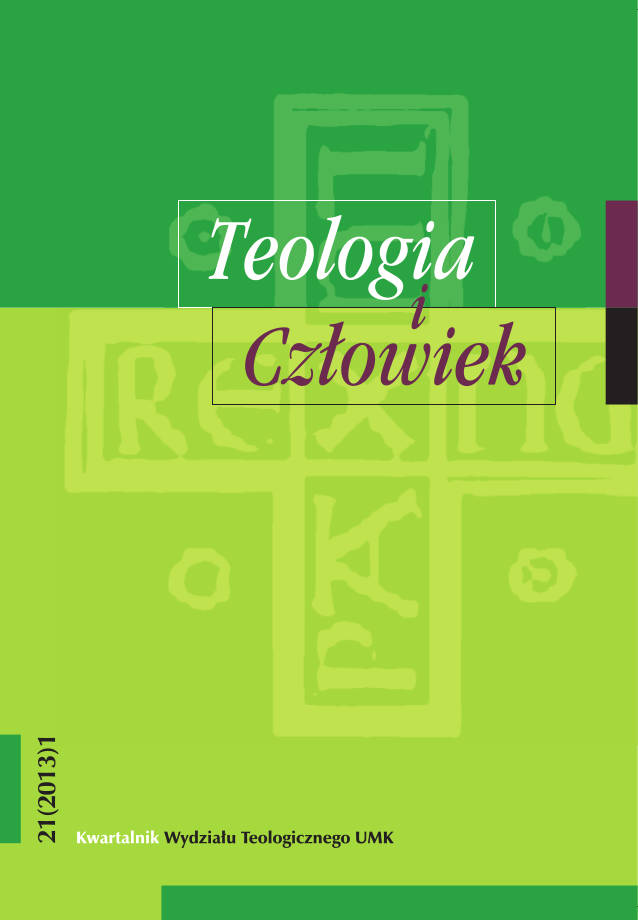The moral teaching of the Catholic Church in the dialog with the modern culture
DOI:
https://doi.org/10.12775/TiCz.2013.002Parole chiave
Moral teaching, culture, Catechism of the Catholic Church, dialogue, DecalogueAbstract
Any catechism’s goal is to present faith in clear and complete way, using language understandable for common people of given time and culture. It has to enter a kind of dialog with modern man and his culture, to serve effectively and bring fruits in faith and moral life. The same is true to the Catechism of Catholic Church, announced by John Paul II. It also has its cultural foundations. One can see them both in goals and means alike, as well as ways of presentation of the deposit of faith. The editors goal was to present the Magisterial teaching in the most clear way. The method is not to condemn errors of present time, together with controversies and apologetics, but to present the truths of the faith and moral issues in the most positive way, knowing the specifics of the recipient, influenced by various cultural currents and tendencies, which are not very friendly to the faith and life built on it. Obviously, the present situation has its impact on the way the problems are presented in the Catechism. The cultural foundations can be recognized, where anthropological progress, technical knowledge and social changes are taken into account, considered as challenges. One can see them where new issues are brought up, and where old ones are interpreted in a new way. The Catechism does not have any specific part focused on modern culture description, however it expresses its attitude toward present religions, sciences, philosophies or political systems describing both man’s relationship with God, as well as his life in human society. Looking from the perspective of twenty years since the Catechism was signed, it can be said, that it became in important element of cultural dialog of the Church. Due to the rapid changes in the culture, the significance of faithfulness to the spirit of the Catechism must be recognized, in the same time leading to on-going analyses and constant adaptation, not in contents, but in manner of presentation of the faith and moral issues.Downloads
Pubblicato
2013-04-04
Come citare
1.
ZADYKOWICZ, Tadeusz. The moral teaching of the Catholic Church in the dialog with the modern culture. Teologia i Człowiek. Online. 4 aprile 2013. Vol. 21, no. 1, pp. 35-52. [Accessed 26 gennaio 2026]. DOI 10.12775/TiCz.2013.002.
Fascicolo
Sezione
Artykuły
Licenza
CC BY ND 4.0. Posiadaczem prawa autorskiego (Licencjodawcą) jest Autor, który na mocy umowy licencyjnej udziela nieodpłatnie prawa do eksploatacji dzieła na polach wskazanych w umowie.
- Licencjodawca udziela Licencjobiorcy licencji niewyłącznej na korzystanie z Utworu/przedmiotu prawa pokrewnego w następujących polach eksploatacji: a) utrwalanie Utworu/przedmiotu prawa pokrewnego; b) reprodukowanie (zwielokrotnienie) Utworu/przedmiotu prawa pokrewnego drukiem i techniką cyfrową (e-book, audiobook); c) wprowadzania do obrotu egzemplarzy zwielokrotnionego Utworu/przedmiotu prawa pokrewnego; d) wprowadzenie Utworu/przedmiotu prawa pokrewnego do pamięci komputera; e) rozpowszechnianie utworu w wersji elektronicznej w formule open access na licencji Creative Commons (CC BY-ND 3.0) poprzez platformę cyfrową Wydawnictwa Naukowego UMK oraz repozytorium UMK.
- Korzystanie przez Licencjobiorcę z utrwalonego Utworu ww. polach nie jest ograniczone czasowo ilościowo i terytorialnie.
- Licencjodawca udziela Licencjobiorcy licencji do Utworu/przedmiotu prawa pokrewnego nieodpłatnie na czas nieokreślony
PEŁEN TEKST UMOWY LICENCYJNEJ >>
Stats
Number of views and downloads: 872
Number of citations: 0



